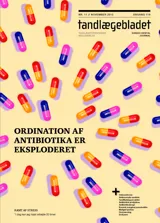Antibiotikaterapi ved kronisk marginal parodontitis
Resultaterne viser en særdeles kraftig stigning inden for de senere år, som synes at omfatte også behandling af kronisk marginal parodontitis.
Anvendelse af antibiotika i behandlingen af marginal parodontitis har længe været et kontroversielt emne. Svarende til at sygdommen opstår som en reaktion på længerevarende ophobning af bakteriel tandplak langs gingivalranden og subgingivalt, vides det, at sygdomsprogressionen i langt de fleste tilfælde kan bremses ved mekanisk plakfjernelse og god mundhygiejne. Visse tilfælde, især inden for den kliniske kategori “aggressiv parodontitis”, har dog vist sig vanskelige at kontrollere med disse metoder, og betegnelsen “behandlingsresistent parodontitis” har været anvendt.
Nogle undersøgelser tyder på, at supplerende behandling med antibiotika kan have gavnlig virkning i sådanne tilfælde. Andre har ikke kunnet bekræfte dette. Enkelte parodontitisforskere har slået kraftigt til lyd for et bredere indikationsområde for behandling med antibiotika omfattende også kronisk marginal parodontitis i strid med skandinaviske faglige retningslinjer. De mener at have konstateret, at supplerende systemisk antibiotikabehandling i forbindelse med depuration mindsker forekomsten af recidiv og dermed reducerer behovet for efterfølgende parodontalkirurgi. Hvis dette princip vinder bredt indpas, vil det medføre en betydelig stigning i tandlægers ordinationer af antibiotika. Dette kunne bidrage til resistensudvikling hos medlemmer af patientens bakterieflora. Også andre bivirkninger kan tænkes i lyset af ny viden om normalfloraens betydning for individets samlede sundhed.
På denne baggrund har vi ved hjælp af Lægemiddelstatistikregistret på Statens Serum Institut undersøgt udviklingen i tandlægers ordination af de typer af antibiotika, som er blevet anbefalet til behandling af parodontitis. Resultaterne viser en særdeles kraftig stigning inden for de senere år, som synes at omfatte også behandling af kronisk marginal parodontitis.
Antibiotic therapy for periodontitis has long been a controversial issue. In accordance with the notion that the disease is a reaction to prolonged accumulation of dental plaque, most cases can be arrested by plaque control including scaling and root planning. However, some cases, mostly of the clinical category of ”aggressive periodontitis”, have proven difficult to control by these means and the term ”treatment resistant periodontitis” has been applied. Some experimental studies indicate that supplementary antibiotic therapy may be effective in the treatment of such cases. Other studies have not confirmed this. A few researchers have advocated strongly an extended scope of antibiotic therapy, and also included chronic periodontitis, which would be against Scandinavian professional recommendations. They claim that supplementary systemic antibiotic therapy reduces the risk of disease recurrence and hence the need for periodontal surgery. If this principle becomes widely accepted, it will lead to a significant increase in the prescription of antibiotics by dentists. Presumably, this would contribute to the development of antibiotic resistance among members of the bacterial flora of the patients. Other side effects are also likely to occur in the view of recent data on the significance of the normal microflora to the overall health of the individual. With this background, using the Register of Medicinal Product Statistics at Statens Serum Institut we have examined the longitudinal development in the prescription of periodontitis- relevant antibiotics by Danish dentists. The results indicate a substantial increase during the latest 15 years, which appears to include also treatment of chronic periodontitis


